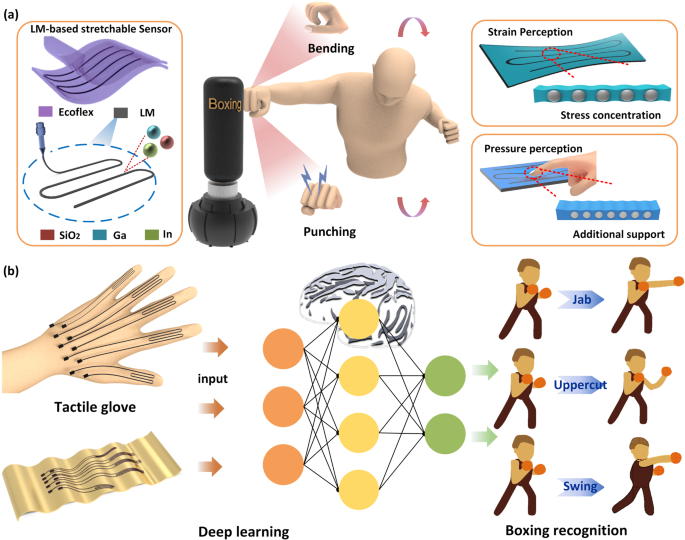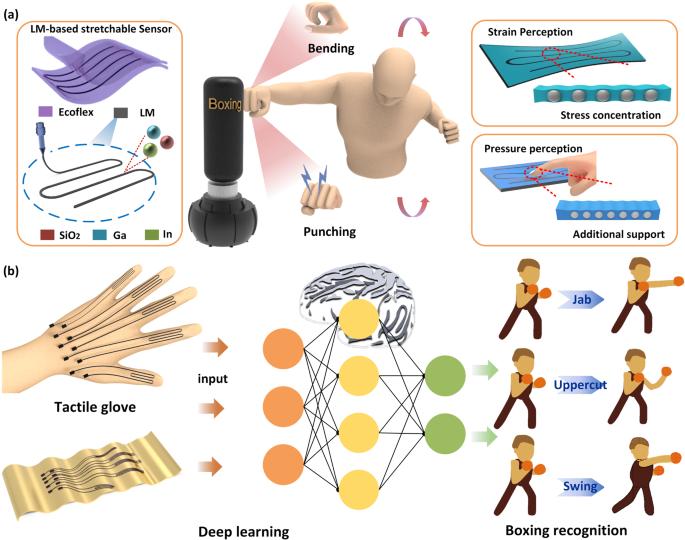Deep-learning-assisted printed liquid metal sensory system for wearable applications and boxing training
IF 12.3
1区 材料科学
Q1 ENGINEERING, ELECTRICAL & ELECTRONIC
引用次数: 0
Abstract
Liquid metal (LM) exhibits a distinct combination of high electrical conductivity comparable to that of metals and exceptional deformability derived from its liquid state, thus it is considered a promising material for high-performance soft electronics. However, rapid patterning LM to achieve a sensory system with high sensitivity remains a challenge, mainly attributed to the poor rheological property and wettability. Here, we report a rheological modification strategy of LM and strain redistribution mechanics to simultaneously simplify the scalable manufacturing process and significantly enhance the sensitivity of LM sensors. By incorporating SiO2 particles into LM, the modulus, yield stress, and viscosity of the LM-SiO2 composite are drastically enhanced, enabling 3D printability on soft materials for stretchable electronics. The sensors based on printed LM-SiO2 composite show excellent mechanical flexibility, robustness, strain, and pressure sensing performances. Such sensors are integrated onto different locations of the human body for wearable applications. Furthermore, by integrating onto a tactile glove, the synergistic effect of strain and pressure sensing can decode the clenching posture and hitting strength in boxing training. When assisted by a deep-learning algorithm, this tactile glove can achieve recognition of the technical execution of boxing punches, such as jab, swing, uppercut, and combination punches, with 90.5% accuracy. This integrated multifunctional sensory system can find wide applications in smart sport-training, intelligent soft robotics, and human-machine interfaces.


用于可穿戴应用和拳击训练的深度学习辅助印刷液态金属传感系统
液态金属(LM)具有与金属相媲美的高导电性和因其液态而产生的优异变形能力,因此被认为是一种很有前途的高性能软电子器件材料。然而,由于流变性能和润湿性较差,要在 LM 上快速绘制图案以实现具有高灵敏度的传感系统仍是一项挑战。在此,我们报告了一种 LM 流变改性策略和应变再分布力学,可同时简化可扩展的制造工艺并显著提高 LM 传感器的灵敏度。通过在 LM 中加入 SiO2 颗粒,LM-SiO2 复合材料的模量、屈服应力和粘度得到了大幅提高,从而实现了用于可拉伸电子器件的软材料三维打印。基于打印 LM-SiO2 复合材料的传感器具有出色的机械柔韧性、坚固性、应变和压力传感性能。这种传感器可集成到人体的不同位置,用于可穿戴应用。此外,通过集成到触觉手套上,应变和压力传感的协同效应可以解码拳击训练中的握拳姿势和击球力度。在深度学习算法的辅助下,这款触感手套能以 90.5% 的准确率识别拳击的技术动作,如刺拳、挥拳、上勾拳和组合拳。这种集成的多功能感知系统可在智能运动训练、智能软机器人和人机界面等领域得到广泛应用。
本文章由计算机程序翻译,如有差异,请以英文原文为准。
求助全文
约1分钟内获得全文
求助全文
来源期刊

npj Flexible Electronics
Multiple-
CiteScore
17.10
自引率
4.80%
发文量
91
审稿时长
6 weeks
期刊介绍:
npj Flexible Electronics is an online-only and open access journal, which publishes high-quality papers related to flexible electronic systems, including plastic electronics and emerging materials, new device design and fabrication technologies, and applications.
 求助内容:
求助内容: 应助结果提醒方式:
应助结果提醒方式:


